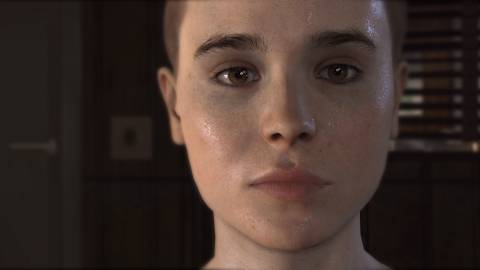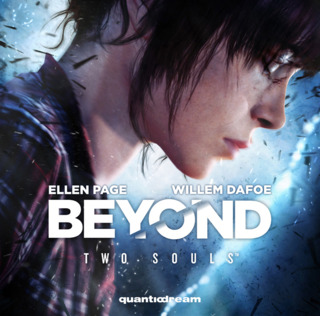Beyond is Quantic Dream's best game to date, yet it's still a clumsy disconnecting experience the majority of the time
With Beyond: Two Souls, Quantic Dream has achieved the most realised version of its distinctive form of interactive storytelling yet. This is a vision the French developer has spent the past decade trying to perfect, cutting their teeth on both the deeply flawed Indigo Prophecy and Heavy Rain in an attempt to bridge the gap between movies and videogames.

Like their previous efforts, Beyond still indulges in the studio’s bad habits, with hokey supernatural elements, underdeveloped characters, some poor writing and questionable illusions of choice and player engagement. Yet it tells their most cohesive tale yet, reaping the benefits of some fantastic performances from an A-list cast and refining the mechanics that make up the game’s limited interactivity. It’s still a distinctly David Cage game, divisive as that is, but there’s slightly less nonsense to forgive if you’re willing to give it a chance.
The casting of Ellen Page should certainly help ease in anyone who has their Quantic Dream-induced doubts. Page plays Jodie Holmes and her performance here is at the heart of everything positive about Beyond. The impressive full performance capture technology lying beneath the surface is able to present every facet of her performance to its fullest, from a trembling bottom lip to a furrowed brow and hurried walk. It’s an emotive display, too, but Page knows when to be understated and the phenomenal facial animation captures this. It’s incredibly expressive, nuanced and almost photorealistic at times, maintaining believability and only occasionally edging towards the uncanny valley.
The rest of the cast is also very strong, particularly Willem Dafoe and Kadeem Hardison. And there’s no sign of the heavily French-accented American’s that populated Heavy Rain either. The only faults present in the characters come from Beyond’s writing and its storytelling structure.
Jodie is one half of the two souls in the game’s title, the other soul is an invisible supernatural entity known as Aiden who has been tethered to Jodie since her birth. His appearance is mysterious and often volatile; he’s fiercely over-protective of Jodie, and while she has some limited control over him, he’s generally left to do his own thing. This lands Jodie in some hot water when her paranormal activity becomes too much for her foster parents to bear, so she spends the vast majority of her childhood locked in a government laboratory under constant surveillance.

This isn’t where Beyond begins, however. While it takes place over fifteen years of Jodie’s life, from childhood to young adulthood, the story is told in a nonlinear fashion in a pretentious nod to the films of Quentin Tarantino and Robert Altman. Loading screens between chapters present a timeline so you can tell where exactly you are in Jodie’s life as you bounce around from scene to scene. At one moment you’ll be a young child in the aforementioned government lab, establishing a bond with Willem Dafoe’s fatherly character, before being whisked off on a CIA assassination mission in Somalia or throwing a temper tantrum as a teenager who just wants to go out on a Saturday night.
It’s all over the place and never does enough with the disjointed narrative structure to justify its inclusion. Journeys into the past will occasionally colour events of the future but it’s never enough and some transitions feel arbitrary. The pacing falters, too, as you go from an intense action sequence to one of the more mundane moments in Jodie’s life. Dramatic tension is frequently lost in favour of an adherence to style.
Most damning of all, however, is the lack of context that accompanies most scenes. Beyond goes for the emotional jugular early and often before it even has a chance to establish its characters. We’re supposed to care about these people we barely know, to exude an emotional response and feel connected to this story, but the fractured timeline frequently disrupts this.
There’s no build up to provide these moments with the emotional heft they require, something that could have been achieved in a linear narrative. Instead, characters change from one scene to the next as the plot jumps forward five years. We’re told they’ve developed and changed rather than allowing it to happen organically in front of us. A contrived romance with an underwritten love interest is the icing on an abhorrent cake.

Beyond is at its best when the focus is on Jodie and we’re presented with a few self-contained vignettes. These non sequiturs delve into her character and present interesting scenarios involving characters you only see for one scene. This gives relationships time to build and grow, something that isn’t possible when the chronology jumps around. We only know these characters in the here and now, seeing how they shape Jodie’s life and how she shapes theirs during the short amount of time they spend together. The writing is at its strongest here, too, proving evocative in its most human and intimate moments, away from the preposterous bombast present elsewhere.
That bombast manifests itself in a number of ridiculous action set pieces. One minute you’ll be fighting a group of cops atop a speeding train during a torrential downpour, then in the next you’re wrestling police dogs and trying to escape a helicopter on a stolen motorbike. They’re certainly exhilarating, if a little overlong, with traditional quick time events thankfully kept to a minimum.
During an early nod to 80’s training montages you’re given a tutorial for Quantic Dream’s latest attempt at cinematic interactivity. While button prompts are present in Beyond’s more banal moments, they’re nowhere to be found in its intense action. Instead, the French developer has smartly solved one of the most pertinent issues with QTEs: a disconnect from the scene playing out in front of you. Normally your eyes are averted away from the action as you focus on whatever button prompt is due up next. In Beyond, time slows down when it’s the players turn to engage, a flick of the right stick in the same direction as Jodie’s movement completing the action. With no button prompts to look out for your focus is entirely on the action at hand, keeping you involved and acutely aware of all the fight choreography and visual flair involved in the scene.

Though, as it turns out, your input is fairly meaningless. Fail one of these combat QTEs and Jodie will take a few hits but ultimately emerge victorious, regardless of your performance. Sometimes failure will result in a slight deviation on the story – perhaps you’ll be arrested by the police – but it doesn’t take long before the narrative is put back on its predetermined track, proving any detour inconsequential. It’s nice not having to repeat QTEs but this solution is inelegant. It removes any tension or sense of threat, and devolves player interaction to a moot point. You’re simply a passenger and it never attempts to convince you otherwise.
The only choices that really matter occur in Beyond’s dire final act, when your decisions carry ramifications for one of the many endings you’ll see. Other than that your interactions with other characters are just a chance to role-play Jodie and establish the kind of person she is. When the CIA comes to take away a teenage Jodie do you choose to burst out in anger or react sadly? Is she remorseful or ironic, petulant or reasonable? It’s a more honest approach after Heavy Rain disappointed with its superficial player choice, but a lack of agency is disconcerting, especially in a post-The Walking Dead world.
Elsewhere, your engagement with Jodie goes from making dinner with some button tapping and a few swipes of the Sixaxis, to primitive stealth sections where you can move from cover to cover and wrestle with unwieldy turning circles. For all of David Cage’s finger wagging at the industry’s penchant for guns and explosions, he certainly doesn’t mind indulging in its tropes himself. The latter half of the game sees some world-ending events come flying out of left field, delving into secret military bases with a control scheme that’s seldom able to keep up with it all.
Controlling Aiden fares better as your spectral form allows you to float across the environment, interacting with the world as the design allows. He has a spate of abilities to deploy, from simply knocking over objects like a poltergeist, to choking people and possessing them. You can be mischievous with him or turn violent, lending Jodie a helping hand when she’s under siege from a SWAT team, for instance.

Unfortunately, however, playing as Aiden is much like playing as Jodie. While you have all of these powers at your disposal you can only use them as the game dictates. There’s no freedom to experiment or think tactically, you can only possess the enemies it says you can, or kill those it allows. Once again there’s no player agency, no feeling of involvement. Even in the momentsBeyond most resembles a videogame you’re still just a passenger along for the ride, adhering to a predetermined path.
These moments of interactivity have been refined and spruced with variety, making Beyond more enjoyable to engage with than any other Quantic Dream game to date. Its story, too, is their best work, aided by strong performances and an avoidance of the pitfalls (for the most part anyway) that made bothIndigo Prophecy and Heavy Rain such chores to get through. Yet the lack of player involvement is severely disheartening.
There’s a lack of tension and attachment to these characters. You feel like you’re watching rather than playing and contributing to a piece of interactive fiction, dampening the effect of even its most affecting moments. Heavy Rain’s choices were deeply flawed and mostly redundant, but to remove any sort of meaningful player engagement from Beyond‘s narrative is the wrong way to go. Since 2010 so many other games have married cinematic storytelling with the interactivity of the medium to splendid results. Beyond feels dated by comparison, despite its massive budget, highly impressive technology and A-list cast. There’s some enjoyment to glean from its narrative and the performances of its cast, and fans of Indigo Prophecy and Heavy Rain will no doubt enjoy it more than most, but Quantic Dream’s vision has yet to be fully realised.
